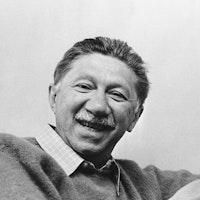[The science of psychology] has revealed to us much about man’s shortcomings, his illness, his sins, but little about his potentialities, his virtues, his achievable aspirations, or his full psychological height.
[The science of psychology] has revealed to us much about man’s shortcomings, his illness, his sins, but little about his potentialities, his virtues, his achievable aspirations, or his full psychological height.
Abraham Maslow

Achievable Aspirations
Topic: Self-Cultivation & Health
“The science of psychology has been far more successful on the negative than on the positive side. It has revealed to us much about man’s shortcomings, his illness, his sins, but little about his potentialities, his virtues, his achievable aspirations, or his full psychological height. It is as if psychology has voluntarily restricted itself to only half of its rightful jurisdiction, and that, the darker, meaner half.”
Abraham Harold Maslow, born on April 1, 1908, in Brooklyn, New York, was an American psychologist best known for creating Maslow's hierarchy of needs, a theory of psychological health based on fulfilling innate human needs in priority, culminating in self-actualization and self-transcendence. Maslow was the eldest of seven children in a family of Jewish immigrants from Kyiv, Ukraine, who fled to the United States to escape Czarist persecution. Despite a challenging childhood marked by poverty and antisemitic hostility, Maslow excelled academically, graduating from City College of New York before pursuing graduate studies in psychology at the University of Wisconsin. His early experiences and education significantly influenced his later work, focusing on human potential and psychological health.
Maslow's academic career was distinguished by his tenure at several prestigious institutions, including Brooklyn College, Brandeis University, and Columbia University. During these years, he developed his theory of human motivation, encapsulated in his seminal work on the hierarchy of needs. This theory posits that humans are motivated by a series of hierarchical needs, starting with basic physiological needs and culminating in self-actualization, the realization of one's fullest potential. Maslow's emphasis on the positive aspects of human nature, such as creativity, personal growth, and self-fulfillment, marked a significant departure from the prevailing psychological theories of his time, which often focused on pathology and dysfunction.
In his later years, Maslow expanded his hierarchy to include the concept of self-transcendence, which he described as the highest level of human development. Self-transcendence involves transcending one's personal concerns to reach a higher perspective, encompassing a holistic connection with oneself, others, and the cosmos. Maslow believed that this level brought individuals "peak experiences" characterized by joy, peace, and heightened awareness. He also introduced the idea of "plateau experiences," where individuals maintain a state of serenity and higher consciousness. Maslow's contributions to psychology extended beyond his theories of motivation and self-actualization, making him a key figure in the development of humanistic psychology. His legacy endures in the fields of psychology, education, and beyond, where his insights into human potential continue to inspire and guide those seeking to understand and enhance the human experience.
Motivation and Personality
Maslow, Abraham H. Motivation and Personality. Harper, 1954, p. 354 [Motivation and Personality: Toward a Positive Psychology, 1954].

Abraham Maslow
Resources
Copyright © 2017 – 2026 LuminaryQuotes.com About Us

Abraham H. Maslow, Motivation and Personality: Toward a Positive Psychology
One of the earliest psychologists to focus attention on happy individuals and their psychological trajectory, in what he named Positive Psychology, was Abraham Maslow, who is most well known for his “hierarchy of needs.”
Maslow’s Hierarchy of Needs and Self-transcendence
In the original model, self-actualization is at the top, with esteem below it, then love/belonging, then safety, and physiological needs at the bottom. This indicates that physiological needs are vital for survival and that they must be sated before one can move up towards actualization and fulfillment. In his early work, Maslow considered self-actualization the pinnacle of human development and the highest human need: the realization of one’s full potential. He later recognized the need for one more level of development.
Self-actualization is indeed a lofty (and worthy) goal of development and should not be cast aside in favor of the shiny new need, but self-transcendence is truly the “next level” of development; it is other-focused instead of self-focused and concerns higher goals than those which are self-serving.
Abraham Maslow, The Importance of Transcendence
“Transcendence refers to the very highest and most inclusive or holistic levels of human consciousness, behaving and relating, as ends rather than means, to oneself, to significant others, to human beings in general, to other species, to nature, and to the cosmos” (Maslow, 1971, p. 269).
According to Maslow, self-transcendence brings the individual what he termed “peak experiences” in which they transcend their own personal concerns and see from a higher perspective. These experiences often bring strong positive emotions like joy, peace, and a well-developed sense of awareness (Messerly, 2017). Someone who is highly self-transcendent may also experience “plateau experiences” in which they consistently maintain or enter a state of serenity and higher perspective (Messerly, 2017).
Maslow’s addition of self-transcendence to the pyramid is not always noted in the literature when his theory is cited, but it has managed to make its way through the research community nonetheless.
Additional Abraham H. Maslow Quotes
“Human life will never be understood unless its highest aspirations are taken into account. Growth, self-actualization, the striving toward health, the quest for identity and autonomy, the yearning for excellence (and other ways of phrasing the striving “upward”) must by now be accepted beyond question as a widespread and perhaps universal human tendency …”
— Abraham H. Maslow [Motivation and Personality, 1954] pp.xii-xiii.
“Transcendence refers to the very highest and most inclusive or holistic levels of human consciousness, behaving and relating, as ends rather than means, to oneself, to significant others, to human beings in general, to other species, to nature, and to the cosmos.”
–Abraham Maslow [The Farther Reaches of Human Nature, 1971] p. 269.